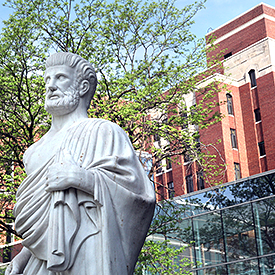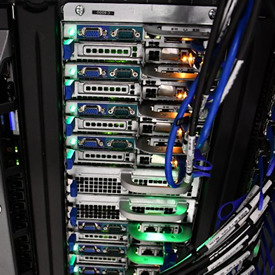The Biologic Resources Laboratory manages the care of animals used in research and teaching in UIC’s fully-accredited Animal Care and Use Program. This includes making sure that UIC meets all government regulations and best practices in its treatment of animals. The professional staff of the lab includes five board-certified veterinarians and 40 animal care technicians; they are responsible for helping about 300 researchers, teaching graduate and technical courses, and directing the postdoctoral training program.
University of Illinois Chicago
Resources & Facilities
At UIC, researchers have the tools they need
The University of Illinois Chicago provides researchers with access to a wide range of opportunities, resources and up-to-date research tools to support their work, promote multidisciplinary collaboration and inspire new ideas.
Centers & Institutes

Global health. Literacy. Urban economic development. Government finance. Cancer, healthcare delivery and juvenile research. These are just a few of the important topics being addressed by UIC centers and institutes, all of which are focused on making human life better.
Researchers from these centers have reported on the inequities experienced by racial and ethnic groups in Chicago, produced collaborative research on understanding of the lives of women and the role of gender in society, and are investigating new drugs for treating everything from known diseases like tuberculosis, HIV and cancer to emerging illnesses like COVID-19. Through collaboration with groups like the World Health Organization, discoveries made at UIC make a big impact on people around the globe.
UIC students play a critical role in this work. They join faculty members, scientists and clinicians in conducting this groundbreaking research. These hands-on educational opportunities are open to students in liberal arts and sciences, public health, dentistry, nursing, medicine and more.
Library

The UIC Library supports you during the entire research process: discovery, use, dissemination and archiving.
Discovery
- Library Research Guides
- Consultations with subject librarians
- Ask A Librarian via phone, email, IM chat, drop-in and by appointment
- Get access to journal articles off campus
- Learn, discover and research with our extensive subject databases and journal collections
Use
- Install the Browzine app to read e-journals on your mobile device
- Manage citations and produce bibliographies in any format with RefWorks
Dissemination
- Advice on writing a data management plan to fulfill federal requirements from the National Science Foundation, National Institutes of Health and others
- Evaluate emerging publishing models such as subject repositories and open-access journals
- Answer Copyright and Fair Use questions
- Identify journal and research impact factors and conduct citation analyses of individuals or groups
Archiving
- Ensure long-term access to research by archiving papers, presentations and data in INDIGO, the campus institutional repository
Research support

UIC’s Research Resources Center (RRC) provides the UIC research community with a broad inventory of high-end scientific equipment and a wide range of services within its research support units and 13 cores. Together the units and cores employ personnel with extensive skill sets in various scientific protocols who are able to assist or execute research projects.
The RRC maintains fully-calibrated instruments, like next-generation sequencers, mass spectrometers, microscopes and cytometers, which are available to researchers along with training and troubleshooting support.
Resources for interdisciplinary research
UIC encourages research that changes lives. Many centers, labs and institutes at UIC promote collaboration across the sciences and humanities. The goal of these groups is to discover solutions to complex local, national and global concerns.

Institute for Health Research and Policy
The Institute for Health Research and Policy is the University of Illinois Chicago’s incubator and home to research that spans health and social sciences to advance health and quality of life among all communities. The Institute sparks innovative UIC research by providing the services and infrastructure needed to develop research ideas, form collaborations and successful teams, and manage grants from proposal to closeout.
At the Institute, faculty-investigators across the university belong to an intellectual community of researchers who influence policy, practice and the community by advancing science. The Institute mentors these investigators in advancing their research goals and provides resources, covering all aspects of research management, implementation, security and dissemination.

Center for Clinical and Translational Sciences
The Center for Clinical and Translational Science is UIC’s hub for clinical and translational health research. The Center seeks to accelerate the process of turning scientific discoveries into new tools and treatments that help prevent disease and improve the health of our communities.
Since 2008, the center has provided resources and services that support the health research efforts of faculty and students in the Colleges of Medicine, Dentistry, Pharmacy, Nursing, Applied Health Sciences and Social Work, and the School of Public Health.

Institute for Environmental Science and Policy
The Institute for Environmental Science and Policy is a research center that promotes science in support of a sustainable future. Solutions to modern environmental problems facing society are increasingly national and global, and their complexity requires that many scholars work together.
The Institute inspires discovery and interdisciplinary collaboration by teaming scholars with their counterparts in the public and private sectors to devise workable solutions for complex environmental challenges, particularly those problems unique to the urban environment.

Institute for the Humanities
For more than 35 years, faculty and student research has been supported by the UIC Institute for the Humanities. Its fellowship program and research awards for faculty have led to major books and articles in the humanities. The Institute also gives humanities graduate students writing support and mentoring.
The Institute supports a variety of conferences and working groups each year to encourage interdisciplinary research at UIC research at UIC. Groups such as Health and Society, Political Ecologies, and Institutions link humanities scholars with researchers in the sciences, public health, and medicine.
Recently the Institute launched a new series of “Frontiers Workshops” that focus on cutting edge issues in the humanities. These conferences bring UIC faculty together with visiting scholars to explore new questions, debates, and methodologies in the humanities. Further initiatives in Engaged Humanities and Digital Humanities offer new opportunities to enhance scholarship and teaching.

Urban Data Visualization Laboratory
Some data is best communicated through visuals. The Urban Data Visualization Lab, part of the College of Urban Planning and Public Affairs, works with researchers throughout campus. For faculty and students, the lab makes data visually understandable and more useful through mapping, geospatial data analysis, presentation formatting and data management.
Researchers can visually find patterns in their data, present data in 3-D form, model spatial relationships, or compare their data with census data. Lab faculty and staff also teach courses in visualization and geographic information systems to provide students with valuable job skills.

Advanced Cyberinfrastructure for Education and Research (ACER)
UIC’s Advanced Cyberinfrastructure for Education and Research (ACER) aims to meet the computational and data needs of all UIC researchers and their collaborators around the globe. ACER offers a wide array of computational resources, data services, workshops, and one-on-one consulting services for the UIC research community. Whether you work in the arts, sciences, engineering, humanities, policy, or health, ACER is prepared to help you with any and all of your data and computation needs.
ACER resources include high-performance computing clusters, collaborative research storage, high-performance networking, and secure research environments. ACER also provides consulting services for researchers, covering topics such as architecture design, statistical methodology, performance tuning, parallelization, and data science tools and techniques. Additionally, ACER hosts tutorials on topics in scientific computing and data science. Through these resources and services, ACER is committed to furthering UIC’s research ambitions.